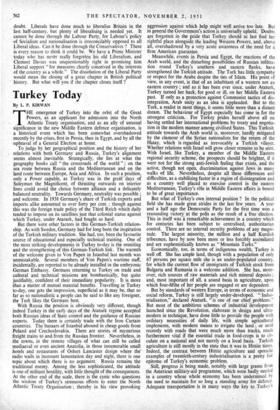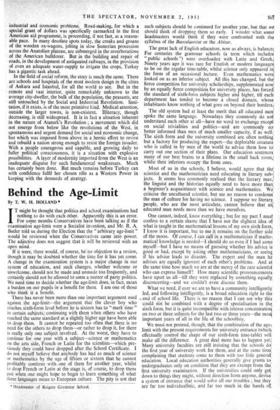Turkey Today
By L P. KIRWAN
HE emergence of Turkey into the orbit of the Great Powers, as an applicant for admission into the North Atlantic Treaty organisation, and as an ally of unusual significance in the new Middle Eastern defence organisation, is a historical event which has been somewhat overshadowed recently by the crises, first in Persia, then in Egypt, and by all the upheaval of a General Election at home. - To judge by her geographical position and the history of her relations with both Germany and Russia, Turkey's alignment seems almost inevitable. Strategically, she lies at what the geography books call " the crossroads of the world " ; on the sea route between Russia and the Mediterranean and qn the land route between Europe, Asia and Africa. In such a position, only a Power capable, as Turkey was -in the grear days of Suleyman the Magnificent, of thru-sting outwards on interior lines could avoid the choice between alliance and a delicately balanced neutrality. Towards Germany, neutrality was possible ; and welcome. In 1938 Germany's share of Turkish exports and imports alike amounted to over forty per cent. ; though against this was the foreign trade policy of the Third Reich which daily tended to impose on its satellites-just that colonial status against which Turkey, under Ataturk, had fought so hard.
But there were other factors in this German-Turkish relation- ship. As with Sweden, Germany had for long been the inspiration of the Turkish military tradition. She had, too, been the favourite source of educational and especially technical training. One of - the most striking developments in Turkey to-day is the reuniting and the strengthening of this German-Turkish link. The warmth of the welcome given to Von Papen in Istanbul last month was unmistakable. Several members of Von Papen's wartime staff, incidentally, are reported to be already installed in the embryonic German Embassy. Germans returning to Turkey on trade and cultural and technical missions are bombastically, but quite justifiably, confident of their immediate popularity. It is more than a matter of mutual material benefits. Travelling in Turkey to-day, one gets the impression, superficial as it may be, that so far as so nationalistic a people can be said to like any foreigner, the Turk likes the Germans best.
With Russia the position is obviously very different, though indeed Turkey in the early days of the Ataturk regime accepted both Russian ideas of State control. and the guidance of Russian experts. Today there is certainly trade with the Iron Curtain countries. The bazaars of Istanbul abound in cheap goods from Poland and Czechoslovakia. There are stories of mysterious freight trains to and. from the Russian frontier. Nevertheless, in the towns, in the remote villages of what can still be called mediaeval or even ancient Anatolia, in those innumerable small hotels and restaurants of Osbert Lancaster design where the" radio wails in incessant lamentation day and night,, there is one topic about which there is no argument. Russia remains the traditional enemy. Among the less sophisticated, the attitude is one of militant hostility, with little thought of the consequences. At the other end of the scale, there is the cynic who questions the wisdom of Turkey's strenuous efforts to enter the North Atlantic Treaty Organisation ; thereby in his view provoking aggression against which help might well arrive too late. But in general the Government's action is universally upheld. Doubts are forgotten in the pride that Turkey should at last find her rightful place alongside the leading Western Powers, and, abdve all, overshadowed by a very acute awareness of the need for a firm American guarantee.
Meanwhile, events in. Persia and Egypt, the reactions of the Arab world, and the disturbing possibilities of Russian infiltra- tion round Turkey's southern and eastern flanks, have strengthened the Turkish attitude. The Turk has little sympathy or respect for the Arabs despite the ties of Islam. His point of view, in any event, is that of an inhabitant of a western not an eastern country ; and so it has been ever since, under Ataturk, Turkey turned her back, for good or ill, on her Middle Eastern past. If only as a protection against Communist tactics of disc integration, Arab unity as an idea is applauded. But to the Turk, a realist in most things, it seems little more than a distant dream. The behaviour of Egypt especially has come in for the strongest criticism. For Turkey prides herself above all on having settled her international problems by treaty and negotia- tion in the modern manner among civilised States. This Turkish attitude towards the Arab world is, moreover, hardly mitigated by the clamour of the Syrian nationalists for the return of the Hatay, which is regarded as irrevocably a Turkish vilayet. Whether relations with Israel will grow closer remains to be seen. With Israel, like Turkey, a member of the Middle Eastern regional security scheme, the prospects should be brighter, if it were not for the strong anti-Jewish feeling that exists, and the active, though not open, discrimination against Jews in many walks of life. Nevertheless, despite, all these differences and difficulties, as a stabilising factor in a region of disintegration and as a country well placed to exercise control in the eastern Mediterranean, Turkey's role in Middle Eastern affairs is bound to be of great importance.
But what of Turkey's own internal position ? In the political field she has made great strides in the last few years. A year and a half ago the Democratic Party for the first time won a resounding victory, at the polls as the result of a free election. This in itself was a remarkable achievement in a country which for centuries has been subject to centralised, authoritarian control. There are no internal security problems of any magni- tude. The largest minority, the million and a half Kurdish tribesmen, have by now been more or less forcibly assimilated and are euphemistically kndwn as " Mountain Turks."
Economically, too, in terms of indigenous wealth, Turkey is well ,off. She has ample land, though with a population of only 67 persons per square mile she is an under-populated country, for which the current flow of immigrants of Turkish stock from Bulgaria and Rumania is a welcome addition. She has, more- over, rich sources of raw materials and rich mineral deposits ; and, most important of all, a sound basis in agriculture, upon which four-fifths of her people are engaged or are dependent. But by standards of western Europe, in terms of economic and social reform, Turkey is still largely under-developed. " Indus- trialisation," declared Ataturk, "'is one of our chief problems." But most of the ambitious schemes of industrial 'development launched since the Revolution, elaborate in design and ultra- modern in technique, have done little to provide the people with ordinary necessities of daily. life, with simple agricultural implements, with modern means to irrigate the land ; or until recently with roads that were much more than tracks, roads furthermore vital if the essential trade in food-crops is to cir- culate on a national and not merely on a local basis. Turkish agriculture is still mostly in the state that it was in. Hittite times. Indeed, the contrast between Hittite agriculture and sporadic examples of twentieth-century industrialisation is a pretty fair epitome of Turkey's economic problem. Still, progress is being made, notably with large grants from the American military-aid programme, which were badly needed in a country whose whole economy has been undermined by the need to maintain for so long a standing army for defence. Adequate transportation is in many ways the key to Turkey's industrial and economic problems. Road-making, for which a special grant of dollars was specifically earmarked in the first American aid programnie, is proceeding, if not fast, at a reason- able pace. In many desolate spots today, the creaks and groans of the wooden ox-wagons, jolting in slow Sumerian procession across the Anatolian plateau, are submerged in the reverberations of the American bulldozer. But in the building and repair of roads, in the development of antiquated railways, in the provision of even an adequate water-supply to irrigate the crops, Turkey has a gigantic task ahead. In the field of social reform, the story is much the same. There are schools and hospitals of the most modem design in the cities of Ankara and Istanbul, for all the world to see. But in the remote and Nast interior, quite remarkably unknown to the average city-dweller, the bulk of the population, the peasants, are still untouched by the Social and Industrial Revolution. Sani- tation, if it exists, is of the most primitive kind. Medical attention, outside the larger towns, is non-existent. Illiteracy, though decreasing, is still widespread. It is in fact a situation inherent in the nature of Ataturk's Revolution ; a movement which did not emerge from below like the revolutions of the West, in spontaneous and urgent demand for social and economic change, but which was imposed from above in a heroic effort to revive and rebuild a nation strong enough to resist the foreign invader. With a- people courageous and capable, and growing daily to fuller political consciousness, it is a situation with explosive possibilities. A layer of modernity imported from the West is an inadequate disguise for such fundamental weaknesses. Much has certainly been done. But much remains before Turkey can with confidence fulfil her chosen role as a Western Power in keeping with the demands of strategy.



































 Previous page
Previous page